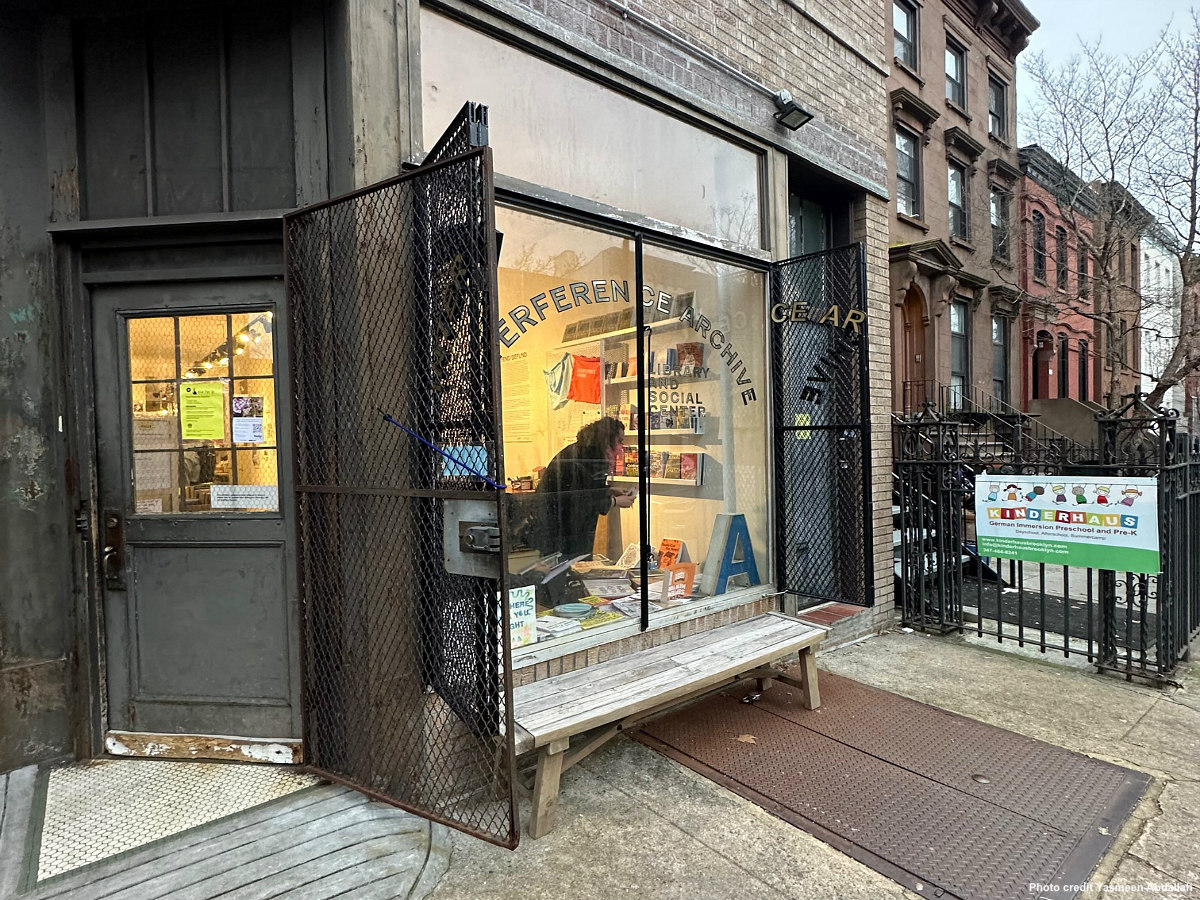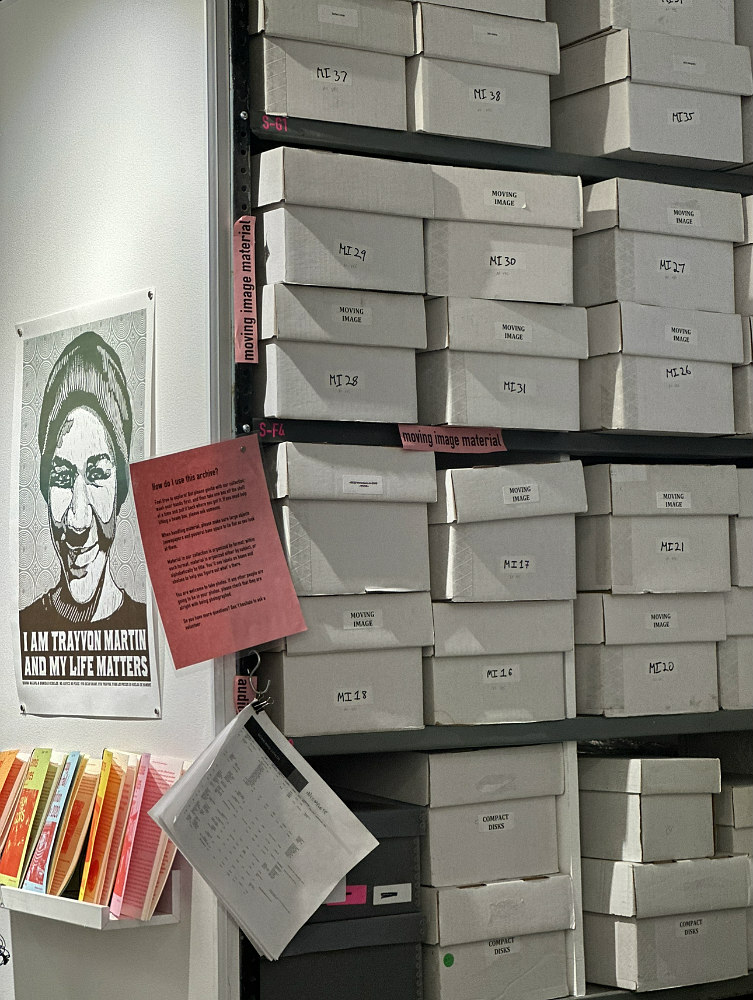Devoted to past social movements and their link to present ones, this makes for a special archive visit. Interference Archive is a beloved space in Brooklyn, New York, that has been doing incredibly important work since it opened its doors in December 2011.
Archives in cities are essential; they tell stories of our collective memory, and foremost, they provide tangible evidence. The Interference Archive utilizes its resources to provide people with direct ways to participate in social justice causes.
The walls of the archive brim with powerful imagery alluding to histories and contemporary problems, with a goal in mind to actively improve the future. People of all ages visit the space, and every nook and cranny is worthy of introspection.
Much of the trove of archival materials focuses on human rights issues and the people fighting oppression all over the world. Cultural production is global in scope and local in its purpose. Its mission is not only to preserve the ephemera it holds, but also to provide access to it in an inclusive environment, allowing people to uncover it at their own pace through its open stacks model.
People are invited to sit and peruse through the archives at their leisure; working groups meet to delve deeper into their work; and passersby drop in to visit the exhibitions and attend the various events that they host. Stunning political posters cover every inch of the surfaces in both gender-neutral restrooms. Their presence honors and upholds the energy of the work of activists, and the causes they are committed to, churning through the bones of the building and the fibers of its soul.
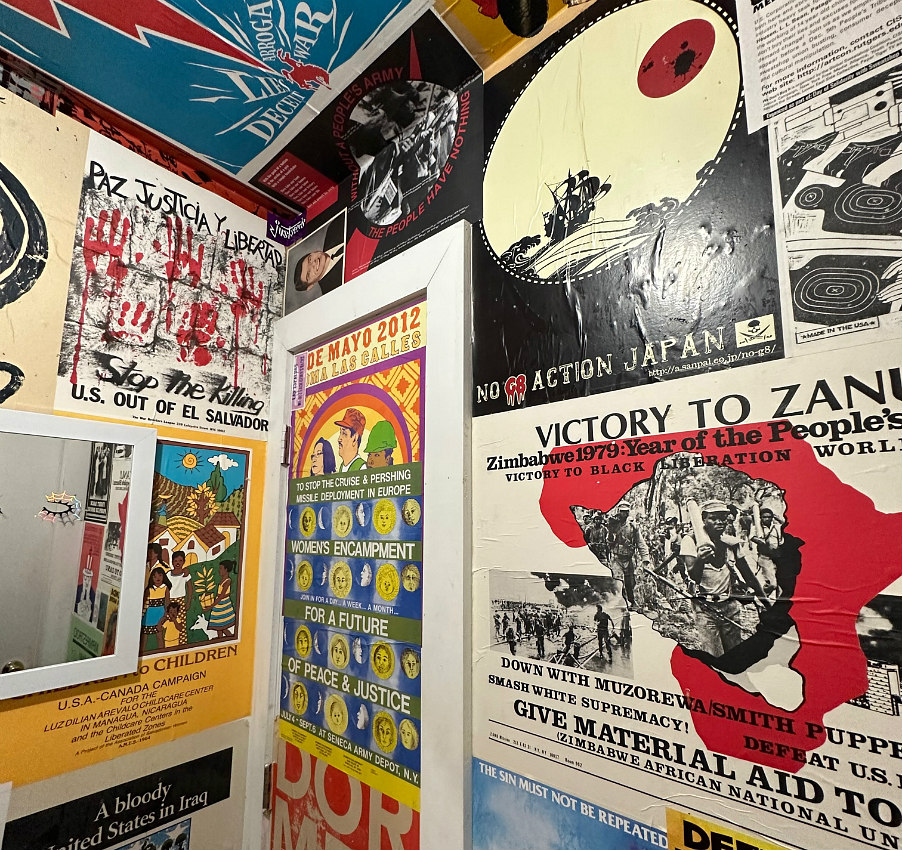
The art and music born out of cultural production are central components of Interference Archive’s mission. The primary focus is on reproducible material culture, including multiples for distribution (flyers, posters, zines, newspapers, books, etc.). They were partly amassed by two of the founders, Dara Greenwald and Josh MacPhee, through their involvement in social movements, DIY and punk, and political art projects over the past 25 years.
Together with Molly Fair and Kevin Caplicki, Greenwald and MacPhee envisioned transforming their personal collections into a public archive, with open access to materials for the community.
The emphasis is on the lineages of imagery of social movements, harkening back to analogue roots that can be built upon in the digital era. It is a generous and exciting way to uncover history through the handling of tangible ephemera, which detail fragments of it through a sensorial experience.
The preservation of material culture illustrates the struggles, injustices, revolutions, and complexities through the words of one’s own experiences and those of their allies. Art in all forms illustrates stories that the mainstream media often woefully fails to include or refuses to include.
Piles of boxes for the archives / Photo credit Yasmeen AbdallahPainstakingly, it strives to foster awareness, critical thinking, and stimulate dialogue, while also promoting a community of inclusion and agency through archival and educational modes of access to publications, art, and records that capture the sentiments, collectivization, and mobility of activist social movements. The intention is to let the roots of history grow into new generations of action and activism through the contemporary and future seeding of ideas and energies.
What makes Interference Archive so special is that it is a volunteer-run collective that functions as a modified consensus through a non-hierarchical model, while creating accessible educational models and providing space for experiential learning through tactility (the opportunity to handle pieces of history that speak through visual communication). Volunteers move around cataloging and compiling in a quiet bustle, everyone engaged and working toward a collective goal of preservation and progress. The archive brings together people with diverse skill sets to share knowledge through their backgrounds in library science, research, art practices, academia, activism, mutual aid work, and a deep commitment to community building.
While the physical experience of being in the space permeates one’s being through a welcoming and relaxed atmosphere, the online experience is equally accessible, informative, organized, and easy to navigate. It offers another route of contemplative discovery and self-directed learning—the website masterfully threads activism, inclusivity, and academic resources with an openness to learn and be present.
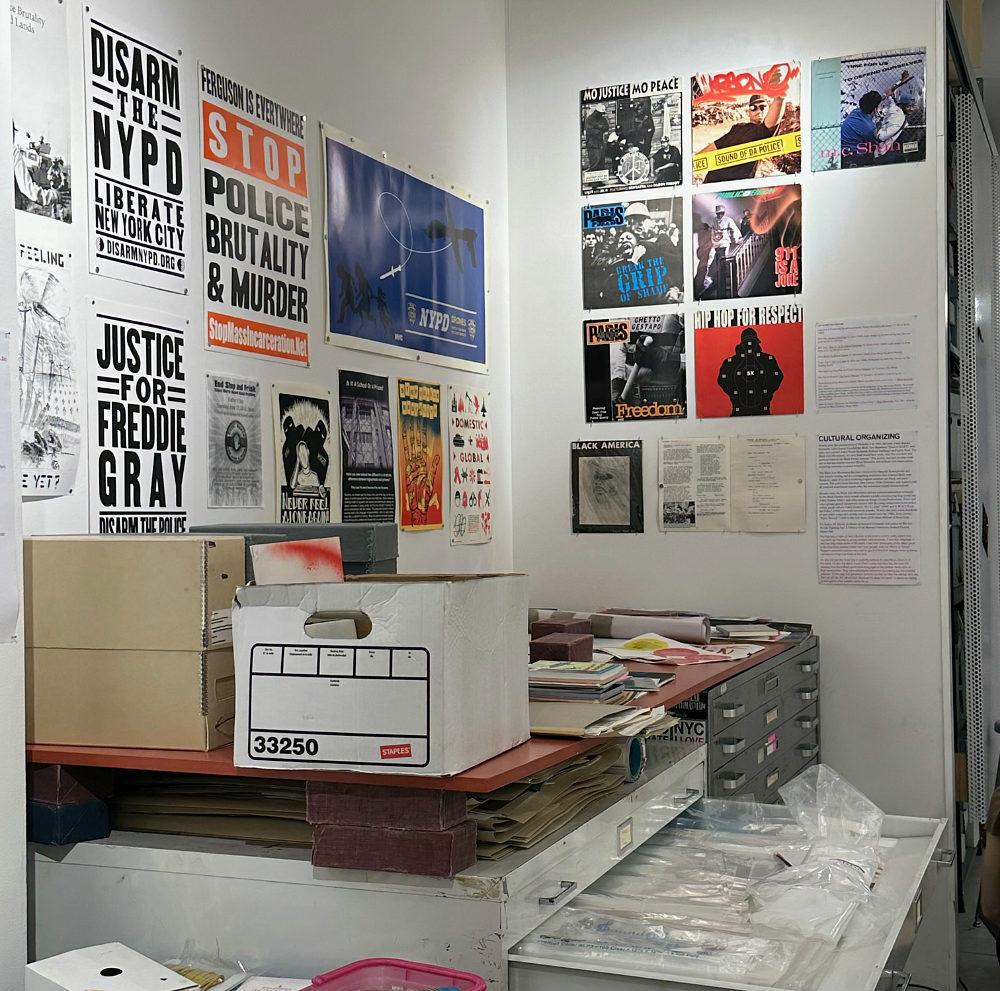
Through events like zine-making workshops, lively panel discussions, and events that include programming crafted to complement the changing exhibitions in the space, people can experience community gatherings that celebrate radical love and mutual respect for both their neighbors and people across the globe. Volunteer Brooke Darrah fondly recalls the propaganda parties and sing-alongs as her favorite memories from her time working at the archive. At the same time, Jen Hoyer spoke about the dedication of fellow volunteers to trudge through a bad snowstorm to install an exhibition, revealing the dedication people have for the space.
In witnessing the meticulous cataloging of donated archival material, people begin to recognize and appreciate the significance of everyday ephemera as something of value and of historical significance. Flyers from past events help visually narrate and illustrate a timeline of moments that many educational models often overlook. The Interference Archive utilizes its space and platform to fill these critical gaps.
The true litmus test of any meaningful, actionable endeavor comes down to one constant and unwavering principle: care. Care for people affected by serious issues; care for the social movements that mobilize to create solutions to, and bring awareness and support for those issues. The care for these objects continues to live on as active, living material culture that motivates activists, researchers, and scholars to continue to do the work to keep pushing for a more equitable and just society for all.
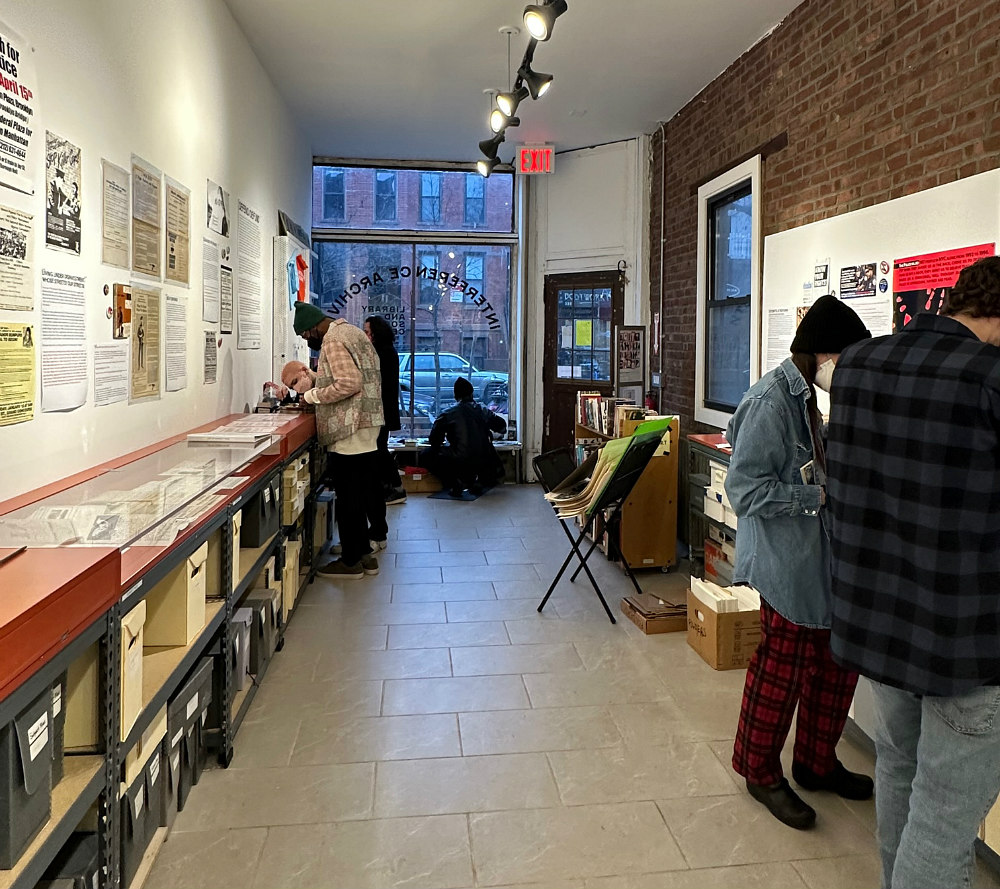
The Interference Archive has also generously lent its expertise to other archives and initiatives when approached, demonstrating another extension of its care for others and its dedication to liberation and solidarity. Some of its funding comes through grants, as well as from individuals who may not have a lot of money but care deeply about the archive’s mission and the issues it is dedicated to addressing. It also employs a subscriber-based model that originated from a healthcare fund established to help cover the medical bills of one of its founders, Dara Greenwald. She was an artist whose memory lives on through the spirit of the archive.
Part of the charm of Interference Archive is the way it feels simultaneously homey and invigorating, with informative, rotating exhibitions of historical and contemporary movements filling the main area. A powerful past exhibition, Our Streets! Our City! Self-determination and Public Space in NYC exhibition was on view from May 21 – Sept. 5, 2022, and was curated by: Nora Almeida, Josh van Biema, Rachel Jones, Marco Lanier, Maya Chang Matunis, Lana Pochiro, Hallel Yadin, Translation: Gaby López Dena, Original Illustrations: Sophie Holin, Audio Collages: Rachel Garber Cole.
This comprehensive exhibition highlighted community work by activist groups in New York including Black Panthers, Young Lords, Poor People’s Campaign, Black Liberation Army, Green Guerillas, Bread and Puppet Theater, Public Space Party, Earth Justice, FUREE (Families United for Racial and Economic Equality, BED (Brooklyn Eviction Defense), Crown Heights Tenants Union, Transportation Alternatives, Time’s Up, Right of Way, Reclaim the Streets, and Make Brooklyn Safer. The show signified the tireless fight for equity and justice by these organizers, and their commitments to food justice, environmental justice, housing justice, and street justice.
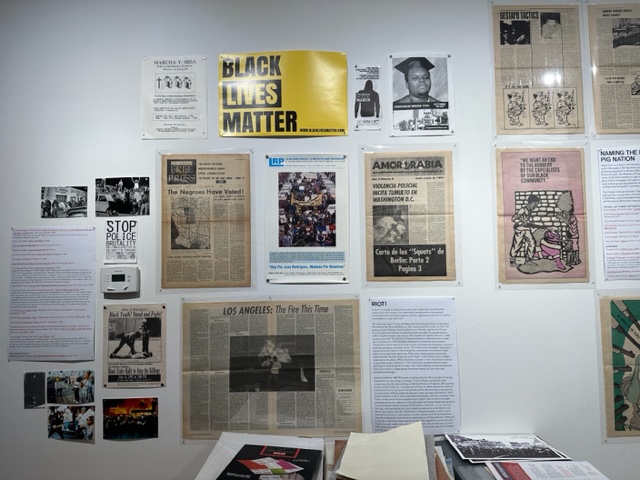
Defend/Defund was Interference Archive’s most recent exhibition, which opened on October 8, 2022, and was on view through January 29, 2023. The show’s focus was on the tireless work of Black organizers and families who have lost loved ones to police violence. Defend/Defund presented a visual narrative of resistance work in response to policing and police brutality over the last two centuries, linking earlier approaches to contemporary ones and highlighting the longevity of both the ongoing issue and the current abolitionist work being done today.
The upcoming exhibition, (take-away archives), is curated by Andrea Ancira and Gaby López. It highlights printed matter related to feminist struggles within societal infrastructure, as a reexamination of public space through both textual and graphic forms, with materials sourced from the Aeromoto Public Library in Mexico City, in addition to the archives at Interference. The exhibition opens on February 19 and will be on view through May 21, 2023.
Interference Archive unequivocally demonstrates the magic of what can be possible when the act of caring occurs through the sharing of material culture, ephemera, art, literature, memories, histories, stories, social movements, acts of resistance, loss, and victory, and brings forth change in the coming generations.
It nourishes the public through its dedication to equity and social justice, as demonstrated by its accessibility of information, solidarity initiatives, and a sense of safety and inclusion in its brick-and-mortar storefront.
Interference Archive is open on Monday evenings from 6-9 pm, Friday from 1-6pm and Sundays 12-5pm, and is closed Tuesday-Thursday.
With deep thanks and gratitude to Jen Hoyer and Brooke Darrah of Interference Archive for their time, expertise, and dedication to speaking about the work that they and Interference Archive do.
